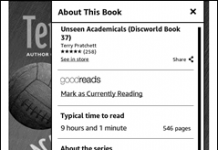 The repercussions from this weekend’s fracas between Amazon and MacMillan appear to be arising already. In a recent piece entitled “Amazon’s Faustian Bargain” I spelled out a nightmare scenario in which publishers will begin to usurp both Amazon and its customers pricing power. At the time I operated under the assumption –based on rampant and somewhat credible rumors- that Macmillan threatened to withhold its products from Amazon unless it complied with Macmillan’s pricing demands: in case you missed all the action, Amazon capitulated. As you may clearly recall Chris Meadows wisely called out Macmillan for possibly advocating and then winning what is potentially nothing more than the right to conduct “resale price maintenance.”
The repercussions from this weekend’s fracas between Amazon and MacMillan appear to be arising already. In a recent piece entitled “Amazon’s Faustian Bargain” I spelled out a nightmare scenario in which publishers will begin to usurp both Amazon and its customers pricing power. At the time I operated under the assumption –based on rampant and somewhat credible rumors- that Macmillan threatened to withhold its products from Amazon unless it complied with Macmillan’s pricing demands: in case you missed all the action, Amazon capitulated. As you may clearly recall Chris Meadows wisely called out Macmillan for possibly advocating and then winning what is potentially nothing more than the right to conduct “resale price maintenance.”
Before the blood has even dried it appears that Amazon’s capitulation has emboldened others into action. Rupert Murdoch -according to recent media reports- has already publicly advanced the notion that he will seek to restructure his content prices which Amazon seems suspiciously eager to agree to. Sadly, as you read these words Kindlers the world over are being slowly stripped of their well fought for prices and the rest of the e-book reading world is silent. Free market advocates have been obstructionist throughout the Kindle boycott’s short yet brilliant history. Their apologist rants have been saturated by cliché and non-sequitur statements such as “I will decide what I can afford” or “the market will decide what the best price is.”
Their opinions would be of particular note if the data substantiated their claims. Publishers -as noted by one of Chris’s commenters- have had a spotty if not pathetic record of using dynamic pricing for e-books in the past. What these free marketers do not get is that the Amazon boycott is a natural defensive response to aggressive and offensive business practices. Boycotters have simply agreed to state publicly that they are the “invisible guiding hand” and have been nailed for it: ironically by people who advance that they simply become powerless individuals. In one particular stunning and apt assessment a then individual Kindler turned Boycotter described his pricing shock as: “you don’t really get it till it’s your own cow that’s being slaughtered.” These two viewpoints -the “individualist” and the “collectivist”- are notoriously difficult to reconcile and the thousands of Kindlers who have turned the tide on our country’s aversion to collectivism are going to be quickly reminded as to who really holds the power in this 21st century digital economy.
The reason “resale price maintenance” is immoral -if not outright illegal- is that it defies the fundamental underpinnings of our economy: fairness and consumer control. It is slowly becoming apparent that as production, delivery and warehousing costs drop, consumers control over the prices that they ultimately pay is also declining. I mentioned earlier how Amazon may be the rare embodiment of Adam Smith’s vision of a “Sentimental” company; it now seems that they may be less “Sentimental” than I gave them credit for. I am wrong and am not above admitting it but what I fear is that the irrefutable “individualists” who have hampered Kindlers attempts to voice their “collective” opinion have allowed the publishing sharks to begin their feeding. In their feeble attempts to pass off nuggets of wisdom they overlooked the fact that the economic axiom that they continue to support and passionately advance is antiquated. Their obstructionist measures and misplaced outrage have done irreparable damage to the Boycott movement which many future e-book readers will have to pay for. In this upcoming lopsided fight between Kindlers and publishers, with its most likely outcome the subsequent reestablishment of producer dictated prices, it may seem that George Orwell said it best: “The quickest way of ending a war is losing it.” For all its worth, I hope George is wrong, because the sharks are hungry and its feeding time.

































Paul, as I understand it, manufacturers are free to set minimum prices under the current U.S. Supreme Court. We see a good example of it in ebook device price setting. Where are the big discounts at Best Buy on the Sony devices, for example. Best Buy gets the full list price as does the Sony Store.
As for “Kindlers the world over are being slowly stripped of their well fought for prices and the rest of the e-book reading world is silent,” what would you expect? I can’t buy at Amazon for my Sony so I don’t really care how much a Kindler has to pay for an ebook. I care about pricing at Fictionwise and Sony and those other stores that do sell books I can read on my Sony.
Additionally, the statement assumes that Kindlers were doing the price fighting; they weren’t. Amazon was doing it to capture market share and once captured, as the current dispute readily shows, Amazon doesn’t care about maintaining a low price, only about coming out on the positive PR side and making money. Amazon could easily have held out and Macmillan would have been the loser — Amazon’s pockets are deeper and its product base much broader than Macmillan’s.
On other point: Although I don’t necessarily agree with Macmillan, I don’t see where Amazon’s actions are any less immoral. What is so moral about having a closed bookstore (i.e., refusing to let its DRM format be on the same device as say ePub — or have we forgotten the exclusivity requirement?)? This is not a fight amongst angels.
If you really want to jump on the immoral bandwagon, jump on Amazon’s refusal to add ePub to the Kindle so Kindlers can buy DRMed ebooks elsewhere without stripping.
Sorry, Paul and Alejandro. When I wrote my response, Alejandro’s name wasn’t listed as author.
Much as I think MacMillan has stepped in a huge pile of fail in this matter, they *do* have the right to determine the price of their products. And customers will be obligated to pay those prices if they want to read the books MacMillan publishes.
That’s capitalism, pure and simple.
However, customers have far greater power than they realize: Simply buy other books only from other copmanies.
If you feel that MacMillan has overstepped its bounds, purchase from other publishers, whether it is folks who “get it” like Baen.com, epresses like Smashwords.com or BooksForABuck.com, small presses, or independent authors such as SteveJordan.com or myself. I will cheerfully sell you my non-DRM ebooks at $1-3!!
Vote with your wallets. Let MacMillan know that you are doing so. But especially tell MacMillan’s authors you are doing this–write blog pots, post comments, contact them, let them know that their publisher had best get with the program or they will lose sales. Let them know that you will not purchase *anything* from them until they offer reasonably priced ebooks.
Boycotts cut two ways.
Bill Smith
http://www.BillSmithBooks.com
Rich,
“If you really want to jump on the immoral bandwagon, jump on Amazon’s refusal to add ePub to the Kindle so Kindlers can buy DRMed ebooks elsewhere without stripping.”
This doesn’t make sense to me, likely due to my limited understanding of the issues.
How does adding ePub capability accomplish anything if the particular DRM used by the ebook seller isn’t addressed?
Thanks, Don
@Rich Adin: You can’t buy at the Amazon store to read on your Sony? How odd. I buy at the Sony store to read on my Kindle and never have any problems – in fact I think I’ve bought read more books on my Kindle purchased from Sony than I have purchased from Amazon.
@ Don Lloyd: “How does adding ePub capability accomplish anything if the particular DRM used by the ebook seller isn’t addressed?”
Well, it doesn’t, obviously (and the lack of standardized DRM is the great failure of ePub, which is otherwise a wonderful format). If you leave DRM out of the equation, Amazon already provides, free, the kindlegen application, which will convert any standards-compliant .epub file to .mobi. If you put DRM back into the equation, I have a hard time picturing Barnes & Noble licensing their DRM scheme to Amazon somehow.
@Peter — No I can’t buy at the Amazon store for my Sony and simply read the book. If I buy one that is DRM-free and in mobi, I can convert it using Calibre. Amazon, which owns mobi, will not allow mobi to be on a device that has any other scheme.
NO Amazon DRMed book can be read on the Sony without stripping and converting.
@Don — I wasn’t clear. Sorry. Yes, Amazon would need to also include the Adobe DRM scheme.
Most Kindlers (and other ebookers) only know how to buy a book, download it to their Kindle, and read it. They do not know how to strip DRM and convert. Consequently, I always ignore that possibility when discussing what is possible and what is not.
I’m a staunch “free marketer” who is solidly on Amazon’s side in this battle.